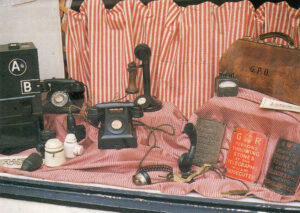
“I ain’t seen one for years,” I said the ironmonger. I wanted a duckboard for my stone-flagged scullery. Central heating, you should know, was a rarity in food-rationed 1950. We used Aladdin heaters burning paraffin at two shillings a gallon to back up the coal fires. Appliances by Mr Hoover cleaned our carpets and washed, wrung and ironed our clothes.
How lucky we were compared with my parents.
I remember in the 1930s carpets were brushed or hung out to be beaten with a bamboo paddle.
Washday was always Monday. A fire beneath the brick-built boiler filled the fairly spacious house with steam. Mangling, airing on a wooden clothes-horse and pressing with a flatiron heated on the cooker completed the laundering process. The worst thing about this Monday ritual ? There was always cold meat for dinner.
In winter, I wore a jersey and short grey trousers supported by a snake buckle belt; in summer a grey shirt, blazer and shorts.
The street scene of those times was unlike today’s. There were neither the quantity nor the variety of cars. Bull-nosed Morris Cowleys, Ford 8s and Austin 7s were popular; Riley, Wolseley, Alvis, Lanchester and, of course, Daimler and Rolls-Royce provided class.
Trams and trolley buses vied with the buses. Coal, bread and milk arrived by horse and cart, milk being served from a churn, Meat came by bicycle; Eldorado and Wall’s box tricycles peddled ice cream. Holiday travel was often by train, when porters found us seats and loaded trunks and cases into the guard’s van.
Street singers, barrel organs and rag and bone men provided life’s background noises. Ex-servicemen with trays tried to sell boxes of matches.
Tramps wandered through the streets, knocked on doors to beg for water, and queued for a night’s shelter at the workhouse.
Entertainment was still largely made at home, and my father, for instance, was a talented musician. I remember that accumulators for our first wireless set were charged at the garage every week for sixpence. We later had a mains-powered HMV radiogram on which we listened to Henry Hall, swing music, promenade concerts, Sandy Powell, Gracie Fields, and naturally, Childrens Hour. TV was broadcast from Alexandra Palace from 1936 but, I only saw it once, a pale blue flickering image, at an exhibition; it was stopped during the war.
As much as anything, I enjoyed the variety acts presented between films at the cinema: acrobats, xylophonists, pianists and comedians. The organist who ascended from
who knows what underground haunt on his instrument during the same interval was also a great favourite. Of the books I read, none could compete with Treasure Island, except maybe White Fang. For entertainment and pleasure combined, I indulged myself with Picture-goer, Film Fun, Hotspur, Wizard, Magnet and Rover. It goes without saying that at that time Bing Crosby was king of the world.
Empire Day never passed forgotten at school; we carried our little flags proudly, just as we wore favours in our chosen shade of blue on Boat Race day. Best clothes were always worn for church and Sunday School treats were looked forward to by those of appropriate age.
School highlights included the Cadet Corps’ Church Parade, marching behind bugles and drums to exult in singing Jerusalem, and the incomprehensible Field Day.
More important, maybe, was Speech Day where more fortunate parents were privileged to see their talented off-spring collecting prizes. School Certificate and matriculation paved the way to university, which counted for more then than it does today.
Imperial Airways carried the wealthy, and famously brought Neville Chamberlain home from his meeting with Hitler at Munich. The Schneider Trophy-winning seaplane was on show in the Science Museum; it was also the day of the airship.
I saw the Hindenburg and the Graf Zeppelin at their moorings and the son of Captain Scott of the R101 was in my class at kindergarten. Seeing the doomed craft leaving that fatal night, I can still recall the funeral procession at Card-ington. Young as we were, and, despite the fact that the great sheds are still there, I think we realised that an era had come to an end.
They were the days of DC electric mains, of sugar weighed into tough blue paper bags, of cheese cut with wire, butter shaped with wooden paddles and biscuits served from large square tins. Hire purchase was frowned upon. A bank account conferred status and commanded respect.
Britain, as it was then, has not only disappeared – but has almost been forgotten (not by Best of British, Sir – Ed).
And duck boards? Everybody had them. In fact, even today they are so essential that, without the interlocking plastic type, our Army wouldn’t be able to defend us!
Sidney Raban








